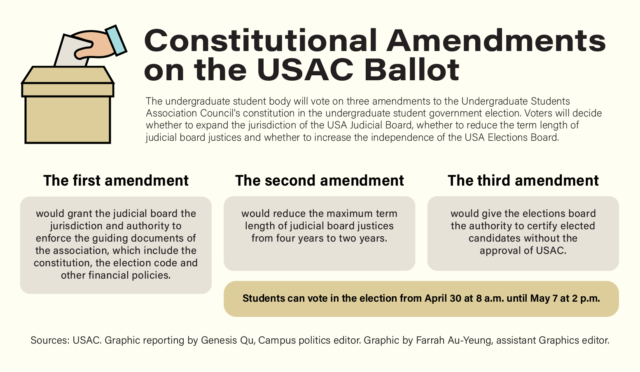Undergraduate students will vote for three amendments to the student government constitution in May after a contentious process to move the amendments on the ballot.
The Undergraduate Students Association Council approved three constitutional amendments that may give more power to the USA Judicial Board and USA Elections Board but also limit the term length of judicial board justices. Bakur Madini, the international student representative and a second-year physics and pre-economics student, originally proposed nine total amendments. However, the council rejected the six other amendments.
The rejected amendments would have eliminated USAC’s power to remove appointees to the elections board, removed the council’s ability to overturn judicial board decisions by a three-fourths majority and lowered the number of student signatures required for ballot initiatives.
Constitutional amendments are initiatives put on the ballot to amend the USA constitution. To put a constitutional amendment on the ballot, the council has to approve the amendment by a two-thirds majority.
Bruin Solutions, a USAC slate carrying the ideas of the former Cost-Cutting Innovations slate, previously circulated a student petition to allow the rejected amendments to be on the election ballot. However, the petition was about 3,700 short of gathering 15% of all undergraduate students’ signatures by the April 11 deadline.
Madini said he was disappointed that USAC did not listen to the 1,000 students who signed the petition. Madini said the number of signatures the petition gathered showed the level of support from the student body for a discussion on the amendments he introduced to USAC.
“(These amendments) deserve to be discussed whether they pass or not,” Madini said. “I want them to pass. Some council members might not want them to pass and that is OK. We are entitled to our opinions but what really matters here is the student voice.”
Two of the three amendments that USAC approved would expand the authority of the judicial board and elections board. One amendment would give the judicial board the jurisdiction to enforce the guiding documents of USAC in case of a dispute. Another amendment would allow the elections board to certify elected candidates without the council’s approval.
Currently, the judicial board has the power to rule on the constitutionality of USAC members’ actions, and the elections board recommends the certification of elected candidates to USAC.
USAC External Vice President Aidan Arasasingham said the amendment on the elections board would be a common-sense reform.
“The folks that are independently operating elections in a nonpartisan environment should be the ones that are independently verifying election results,” said Arasasingham, a fourth-year global studies student.
A third amendment would reduce the maximum term limit for judicial board justices from four years to two years. Judicial board justices review disputes involving infractions of USA’s constitution, bylaws and election code.
Arasasingham said he thinks this amendment would limit the judicial board’s independence from USAC because a longer term limit allows justices to stay nonpartisan and remain less connected to council affairs. Arasasingham is the only USAC officer who voted against the introduction of the amendment.
Ellen Park, the chief justice of the judicial board, said she has never seen a justice serve out all four years of their term in her almost three years on the board. Justices usually serve two or three years and chief justices – who preside over the judicial board – tend to be on the board for three years, she added.
“I think limiting it to two years is going to make it a little bit harder internally for how the judicial board would work because I think the board does have a pretty long learning curve,” Park said.
Promise Ogunleye, the Cultural Affairs commissioner and a third-year public affairs student, said at the April 6 council meeting that she believes reducing justices’ term lengths will allow more people to serve as justices and make the board more equitable for certain communities, such as transfer students.
The amendment would also reduce the power the USAC president exercises by appointing justices to the board, she said.

